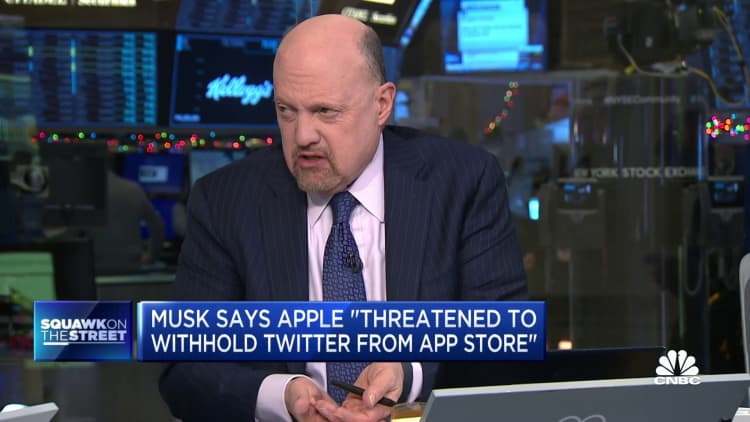Tim Cook walks in the Paddock prior to the F1 Grand Prix of USA at Circuit of The Americas on October 23, 2022 in Austin, Texas.
Jared C. Tilton | Getty Images

watch now
Apple has remained a sleeping bear in the face of Musk’s provocations. It has not commented, nor has CEO Tim Cook, and while its app review moderation staffers may be talking to Twitter behind the scenes over questionable content, Apple hasn’t pulled the app. In fact, Twitter got an update through app review last week.
Twitter is not that important to Apple from a business perspective. It’s just one of a vast number of apps on the App Store, and it isn’t a huge moneymaker for Apple through in-app purchases.
But on Tuesday, Florida Gov. Ron DeSantis and Ohio Senator-elect J.D. Vance, both Republicans, made remarks about Apple’s situation that show how Musk could put Apple in a tough spot.
Here’s one way it could go:
- Musk makes a change to Twitter in order to bypass Apple’s 30% fees, such as allowing users to plug their credit cards in to the app to subscribe to Twitter Blue or other new features.
- Apple pulls the app because of these violations.
- Musk frames the dispute with Apple as an issue over free speech and content moderation, and Republican politicians agree.
- Apple gets caught up in a nationwide debate over free speech and monopoly power focusing on its App Store.
How things could play out
On Tuesday, DeSantis said at a press conference that if Apple were to kick Twitter off, it would show that Apple has monopolistic power and that Congress should look into it. DeSantis framed it as an issue of free speech — many conservatives believe that social networks, including Twitter, generally discriminate against conservative viewpoints.
“You also hear reports Apple is threatening to remove Twitter from the App Store because Elon Musk is actually opening it up for free speech, and is restoring a lot of accounts that were unfairly and illegitimately suspended for putting out accurate information about Covid,” DeSantis said.
“If Apple responds to that by nuking them from the app store, I think that would be a huge, huge mistake, and it would be a really raw exercise of monopolistic power,” he continued.
Vance framed the situation similarly in a tweet, saying that if Apple pulled Twitter, “This would be the most raw exercise of monopoly power in a century, and no civilized country should allow it.”
In fact, Apple’s app review department is unlikely to pull Twitter over content. While Apple regularly bans apps over questionable content, they are rarely big brand names such as Twitter — they’re usually smaller, lesser-known apps. Apple’s rules for apps with significant user-generated content, such as Twitter, focus less on specific kinds of infringing content and more on whether the app has a content filtering system or content moderation procedures. Twitter has both, although Musk’s recent cuts to Twitter’s staff could hurt its ability to flag problem posts.
But Apple would be much more likely to pull the Twitter app if Twitter tries to cut Apple out of its platform fees.
It’s happened before. In 2020, Fortnite added a system inside its iPhone app that allowed users to buy in-game coins directly from Epic Games, cutting out the 30% of sales that Apple typically takes. Apple removed Fortnite from the App Store the same day. The episode kicked off a legal battle, which Apple won on most counts but is currently in appeals.
Google takes a similar cut for Android apps sold through its Play Store but also allows other Android app stores to exist and allows people to “sideload” apps directly onto their phones, while Apple has an exclusive lock on all iPhone app distribution.
Musk has good business reasons to pick this fight.
In particular, Musk wants Twitter to make much more money from direct subscriptions and not advertising. But Apple’s 30% cut of purchases made inside apps is a major hurdle for a company that is slashing costs and has a significant debt load.
So Musk could pull an Epic Games move and enable direct billing, spurring Apple to take action, while at the same time framing the debate around free speech. If that happened, as DeSantis suggested, perhaps Congress would start asking questions. Apple would become a football in political debates. Executives could be forced to testify or provide written responses.
At the very least, you’d have lawmakers such as Vance using the words “monopoly” and “Apple” in the same sentence. That’s a risk to Apple’s brand. Debate over these topics could reenergize pending regulation such as the Open Markets Act which threatens its control over the App Store and its significant profits.
The last time Apple pulled an app that was popular with conservatives for lack of content moderation was Parler in January 2021. It was restored in April.
In the interim, Apple faced official inquiries from Republican Sens. Ken Buck and Mike Lee about why Parler was removed from the App Store. Cook appeared on Fox News to defend the company’s decision.
Twitter is a significantly more important and well-known social network than Parler was and would grab more attention.
It’s probably most valuable for Apple if Twitter remains on the platform. The controversy-averse iPhone maker would probably like this whole Elon Musk narrative to go away.
Indeed, it could play out this way: Apple remains silent, working with Twitter behind the scenes on its app, and Musk tweets about the 30% cut when it irks him. Nothing really changes.
But Musk is unpredictable, and if he does really want to “go to war” over 30% fees, Apple could be forced into a tough spot.
Apple and Twitter did not immediately respond to requests for comment.
